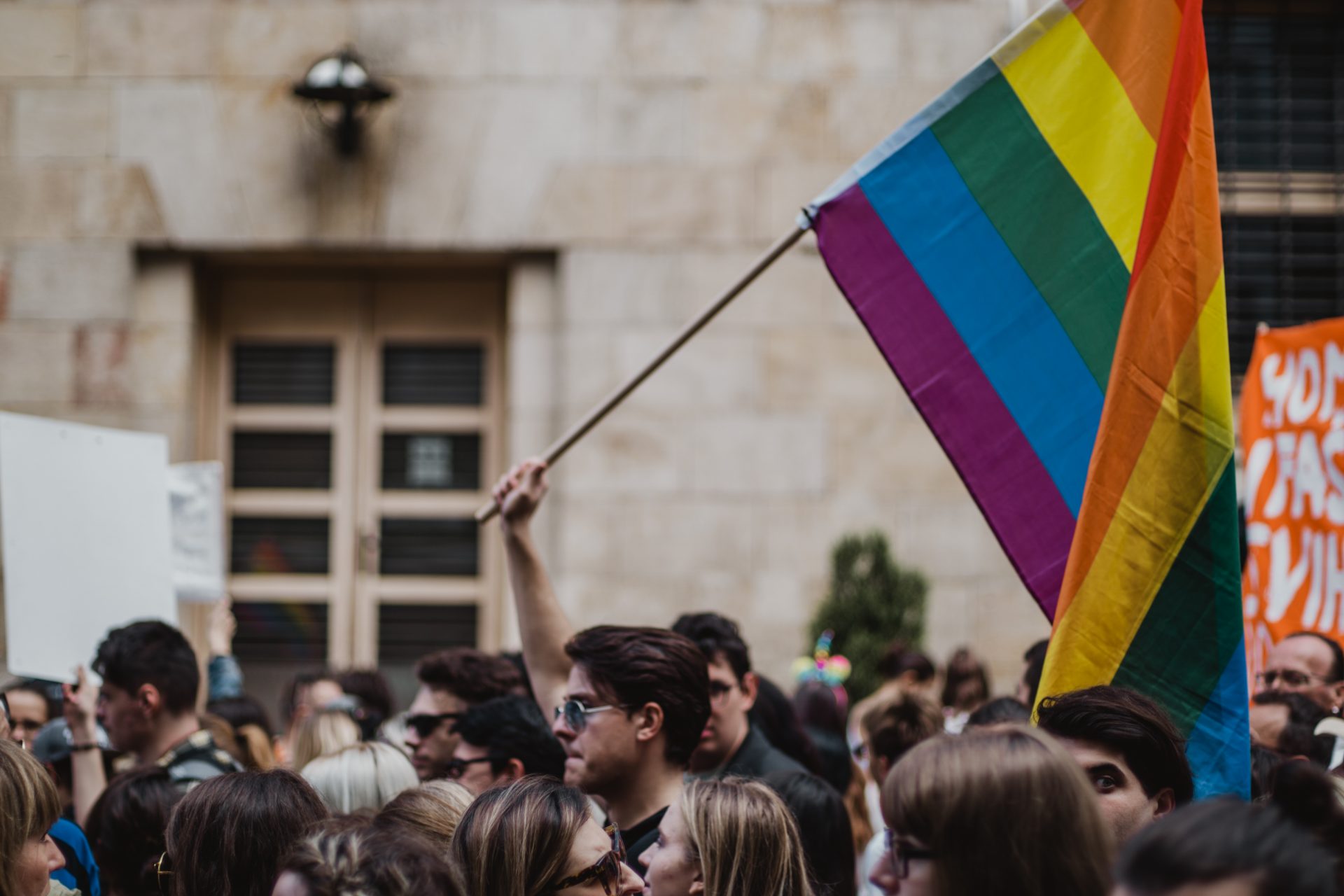
In 2019, queer activists in Bosnia and Herzegovina (BiH) organized the country’s first-ever Pride March in Sarajevo.
The event received international coverage and was widely acclaimed for its significance. Academic research has even shown that it helped improve public opinion toward queer people among residents of Sarajevo.
Yet the fight for equality extends far beyond the coordination of annual, high-visibility pride marches. Not to mention, the state of the world has changed dramatically since 2019, most obviously as a result of the COVID-19 pandemic. How have queer people and activists in BiH built upon the momentum of the 2019 Pride March while navigating newfound challenges caused by the pandemic?
Progress since Pride
Since the 2019 Pride March, queer activists have observed a changing political, legal, and social environment, and have achieved some key successes. In an interview, Dajana Bakić, Executive Director of the Tuzla Open Centre (TOC), an LGBTQI+ activist organization in BiH, emphasized that Pride constitutes the “most visible tool used to place a spotlight on the issues and needs” of the queer community. This, in turn, helps change public perceptions of queer people and what Pride actually is—a protest for equality, rights, and freedom.
Queer activists argue that this form of visibility has placed LGBTQI+ rights more effectively on the public agenda. In an interview, Branko Ćulibrk, member of the Organizing Committee of the BiH Pride March, said, “violence and discrimination issues directed towards the LGBTI community and individuals are more and more often a topic of debate and we have seen an increase in reporting hate crimes. Moreover, from a normative standpoint, the pending Draft Law on Same-sex Partnerships in FB&H has become a hot topic, but also an Action Plan for LGBTQI+ equality at the state level is underway. These are all small steps that lead to a brighter future for this country, for all of us.” Bakić adds that activists were “included in different kinds of working group discussions about the laws of freedom of assembly,” allowing them substantive input on the processes of forming these new laws, particularly in the Sarajevo Canton and the Tuzla Canton governments.
Pride cannot, in and of itself, generate institutional change, but activists can harness the visibility and public awareness that Pride brings to amplify queer issues, to be taken seriously by political actors, and to be included in reform processes. As Bakić emphasizes, “Lives are not changed by one Pride. We still have the same laws. We still face violence and discrimination. But, the March was a huge step in changing how pride is perceived. Also in the legal framework, things started to move a bit.”
These small victories are important but have also been endangered by the pandemic. The aforementioned Draft Law on Same-sex Partnerships has been taken up by an inter-ministerial working group at the Federation of BiH, which was formed in February 2020. This was certainly a positive development. Darko Pandurević of the SOC noted that “the working group is mostly comprised of people who are willing and open to do their job, who approach the assignment professionally, and who do not have preconceived notions or attitudes about the subject. They also saw the Sarajevo Open Centre as a partner in the entire process, which dispelled some initial concerns that the work itself and our involvement in the working group would be a battle with windmills.”
But the working group’s progress, already relatively slow, languished throughout the rest of the year. Ultimately, only one meeting was held throughout 2020. This slow progress has not deterred activists from pursuing the legal path to equality. For instance, Pandurević also highlighted the SOC’s continued use of strategic litigation to advance queer rights through the judicial system.
Adapting to the Pandemic
Responding to slow institutional progress through strategic litigation is just one example of how queer activists have navigated challenges to progress in BiH: through creativity and a willingness to adapt. This mindset has been a crucial tool in responding to the COVID-19 pandemic. Ćulibrk said, “our struggle must have continuity, despite current circumstances, where we are forced to conquer public space in new and imaginative ways.” In other words, the pandemic did not deter queer activists, but rather emboldened them to devise unique ways to accomplish their objectives.
Ćulibrk provided several specific examples of how queer activists creatively worked to promote visibility. “Although we were forced to cancel the Pride last year and it was not held in the form of a protest march, we were still present in public spaces, working on the [visibility of the] LGBTI community and other issues the entire time. This year we had several activities, and one of them was the celebration of May 9, Victory Day, where we, in cooperation with other organizations from BiH, held street actions in five cities throughout Bosnia and Herzegovina. Furthermore, we created the campaign ‘Behind Margin Walls’, which arose from the need to provide an open space for sharing LGBTI experiences in their day-to-day lives. Our goal is to enhance the visibility of the wide spectrum of experiences that the community is going through, to fight against the neglect and ignorance of those experiences. In short, to give a voice to those who go unheard by the general public,” he said.
Activists also developed new ways of connecting with and providing direct support to the queer community in BiH. Bakić explained the TOC’s approach: “We asked people to write us stories, send us photos, and share their concerns and voices about what they were going through in the pandemic. We also made a publication focused on queer art during self-isolation, and [published a book] of [various] queer stories. We did a small questionnaire with the LGBTQI+ community on what their needs were. Did they need money or did they need any help? Most of the answers that we got were related to a lack of gathering, because usually our workshops and our parties are the only safe space for them.”
Sustaining Community and Building Solidarity
The ability of queer activist organizations to serve as safe spaces for the queer community in BiH has been a fundamental part of addressing the newfound challenges that the pandemic has created for queer people all over the world. In particular, social distancing and lockdown measures have resulted in many queer people spending more time in potentially unwelcoming or unaccepting home environments. Naturally, this can have a severe negative impact on the mental health of queer people. This has made the work of queer organizations in BiH that much more important, as their role extends beyond what most people associate with activist organizations, like political advocacy and public awareness campaigns. Their function as a key support network manifests both in their ability to offer important services, like counseling and sexual education, but also to provide a place for queer people to gather and to find refuge in one another.

For instance, this summer, the SOC and TOC organized “Kvirhana,” a queer arts festival that featured films, exhibitions, and drag performances. The festival also included time for queer individuals to socialize and get to know one another. In an interview with Radio Free Europe, the Executive Director of SOC, Emina Bosnjak, emphasized that Kvirhana was intended to constitute a space where “queer people… [could] not only be what they really are, but also celebrate their identities.”
Bakić places this year’s Kvirhana in context, saying that “what was different from previous years of organizing the International Queer Film Festival Merlinka —this was our seventh festival—is that most of the people there were from the LGBTI community. Usually it was supporters and allies [attending], as people are afraid to go to public events because of possible labels and security reasons. People were crying after the festival ended because they felt so happy and free and accepted, so being able to provide that kind of space and support and change for their lives … that’s our mission.”
A queer woman who interviewed with PCRC’s Love Tales Project explained the impact of having these spaces on her own life. “In Sarajevo, there is the SOC Association and the CURE Foundation. Without these associations we would be nowhere. We would remain invisible. It’s a small group of people. I know them all. I hang out with them. I’m really grateful that there is someone who does something for us,” she said.
Challenges Remain
Queer activists have persevered through the pandemic, sustaining and expanding their efforts to achieve greater visibility, motivate political and legal reform, and improve the wellbeing of queer Bosnians. Nevertheless, it is important not to minimize the obstacles that continue to affect their work.
For one, the pandemic has also proven a convenient tool for authorities looking to restrict queer activism. In the past, authorities have used a flurry of stringent bureaucratic measures, including requiring queer organizations to take on the cost of expensive security barriers, as a method of disincentivizing them from planning events. This trend appears to have continued with the pandemic. The Balkan Investigative Reporting Network cites Mirza Halilcevic, a queer organizer, who said at a Pride-related webinar, “it is symptomatic that under the excuse of security or pandemic issues, gatherings that have an LGBTIQ prefix are being forbidden. It is a reminder of all those other excuses when we were rejected for this or that reason. When you find yourself in a situation with a similar pattern, where you have already experienced that your gatherings or requests have been rejected, it requires deeper research and questioning of the reasons – did we postpone the march because it had become a security issue, or was this just another of those homophobic challenges that we need to overcome? I believe it is both.”
Next, increased visibility can be a double-edged sword. While necessary in order to place LGBTIQ+ rights on the public agenda, queer visibility can trigger backlash, particularly in the form of hate speech and hate crimes. The SOC found that “since the First B&H Pride March took place in 2019…the increase in threats and violence in public places and/or online sphere/social networks tripled.”
Finally, the strength of ethno-nationalism and the political dysfunction embedded in BiH institutions creates perhaps the most difficult barrier to progress. Pervasive ethno-national narratives have painted the struggle for queer rights which differ from the identities that political elites in BiH extol for electoral success. However, some research does indicate that activists’ efforts may be piercing through these narratives, at least to some extent. Nevertheless, particularly rule-of-law institutions often fail to take violations of LGBTIQ+ human rights seriously. Ćulibrk argues that “it is a huge responsibility of institutions that are not ready to take a public stand and say that they will do everything in their power to protect LGBTI people from violence, to call for cooperation and to report cases of hate crimes.”

A Path Forward
When asked what people should know about the status of the LGBTIQ+ movement in BiH today, Ćulibrk emphasized, “the fact that the fight for LGBTI rights is not exclusive, but rather inclusive – we are more than open and ready to provide support in all cases of injustice to various groups.” He continued, “in this sense, the BH Pride is one of the tools to create a free and fair society where all citizens are equal. Understanding and compassion are key components to creating such a society, even when we don’t see eye to eye, we should accept that differences exist and that LGBTI people are just as important as anyone else in this society.”
Queer Bosnian activists achieved something remarkable when they organized the first Pride March in 2019. It was just announced that the second Pride March will be held in-person on 14 August 2021, which will hopefully serve as an important marker of visibility for queer people in BiH once again.
What is equally important to acknowledge is the dedication and determination that queer activists display each and every day. While this work cannot always be easily encapsulated by an international headline, it is a necessary ingredient for the construction of a just society in which queer people can not only publicly exist, but prosper. Each new challenge has spurred queer people and activists in BiH to leverage their creativity and ingenuity in order to expand and magnify their efforts at achieving progress.
The experience of the pandemic in particular demonstrates that against all odds, queer people and activists display incredible resilience in BiH. As Bakić put it, “We are queer. We are proud. Our lives are tough and it’s quite challenging, but we are brave enough and ready to challenge the system and fight for our freedoms and rights.”






